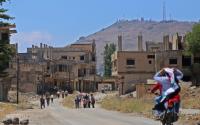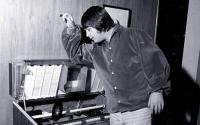24 May 2007Angela Macdonald-Smith
Clare Idriss was so concerned about carbon emissions generated by her wedding guests traveling across Australia in October that she bought A$350 ($283) of pollution credits to offset the greenhouse gases.
Idriss, 26, says Prime Minister John Howard isn't doing his part to address climate change. Howard has refused to ratify the Kyoto Protocol on reducing carbon emissions, saying it will hurt the economy of the world's largest coal exporter.
``There are a lot of options out there, but they're choosing not to be supportive,'' said Idriss, an engineer who got married in Mittagong, 110 kilometers (68 miles) southwest of Sydney.
New weather patterns have become a hot-button issue as the world's driest inhabited continent suffers its worst drought ever recorded. The debate may help determine who will be Australia's next prime minister in an election due by Jan. 19.
Kevin Rudd, leader of the opposition Labor Party, pledges to ratify Kyoto and cut emissions by 60 percent by 2050 if he wins control of the government.
``Given how close the election is going to be, it could be a decisive factor,'' said Andrew Macintosh, deputy director of the Australia Institute, a Canberra-based research group.
John Jordan, a retired store owner from Killcare, near Sydney, says Howard's government is better at running Australia's surging economy than Labor would be. Howard has delivered 10 straight budget surpluses. The 4.5 percent jobless rate is a 31- year low.
``You can't tackle problems like climate change without a surplus budget, and Labor doesn't run surplus budgets,'' said Jordan, 58. ``The government is a better economic manager, with lower taxes, more disciplined spending, low interest rates and a strong jobs market.''
It's Time
Forty-three percent of voters back Howard's 11-year-old government, compared with 57 percent for Labor, according to a May 18-20 survey of 1,151 people by market researcher Newspoll. The margin of error was 3 percentage points.
A March survey commissioned by the Climate Institute, a Sydney-based lobby group, found that 80 percent of the almost 1,000 Australians polled supported laws to curb greenhouse gases.
``It's one of those genuine moments when an issue's time has come,'' said Murray Hogarth, campaign manager at Easy Being Green, a Sydney-based company that sells carbon credits to households and companies.
A temperature increase of 2 degrees Celsius (3.6 degrees Fahrenheit) may bleach 97 percent of Australia's Great Barrier Reef, the world's largest coral system, every year, according to the national science agency. Prolonged bleaching, caused by the loss of algae that live in the reef, can kill coral.
Going Dark
Sydney households, businesses and landmarks such as the Sydney Opera House turned off their lights for an hour March 31 to raise awareness about saving energy and reducing emissions.
About 2.2 million people flipped their switches, according to a poll for the Sydney Morning Herald, which sponsored the event. Energy use was 10 percent below normal in the business district, said Energy Australia, Sydney's power distributor.
Howard's Liberal-National coalition is trying to bolster its environmental credentials. In February, it announced plans to ban incandescent lights by 2010 in favor of more energy-efficient fluorescent bulbs. That may cut greenhouse emissions by 4 million tons a year by 2015 -- 0.7 percent of current levels.
Treasurer Peter Costello allocated A$150 million in his May 8 budget to double the rebate for homeowners who install solar panels.
``I'll embrace policies that make a contribution to reducing greenhouse gas emissions in a proportionate, measured way that don't destroy jobs, particularly in the coal industry,'' Howard said at an April 12 press conference.
Coal exports will earn Australia A$22.3 billion in the year to June 30, the government forecasts.
Switching Sides
Paul Verness, a Perth accountant, isn't impressed, so he's switching allegiances to Labor.
``Howard's climate change policy is a joke,'' said Verness, 36. ``It's been dreamed up because he knows it's on people's minds, not because he cares about what impact we are having on the environment.''
Australia generates 85 percent of its electricity from coal, helping make it the industrialized world's biggest greenhouse gas emitter per person, according to the Australia Institute.
The nation released 559 million tons of carbon into the atmosphere in 2005, about 1.5 percent of the global total, the government's Greenhouse Office estimates.
Grassroots and government efforts in Australia probably won't help slow global warming because the climate is ``hostage'' to U.S. and Chinese policies, said Ziggy Switkowski, chairman of Australia's nuclear research institute.
``Nothing we can do today, next month or next year will materially make a difference to our climate,'' he said.
Greenhouse Guilt
Emissions offsets reduce a person's ``carbon footprint'' by guaranteeing that for every ton of greenhouse gas emitted, a ton won't be produced elsewhere.
Such programs may deter people from cutting energy use by easing their greenhouse guilt, said Iain MacGill, an energy lecturer at the University of New South Wales in Sydney.
That won't stop Idriss, who bought credits for her wedding.
``You've got to do what you want everybody else to do,'' she said. ``Like Gandhi said, be the change you wish to see in the world.''
To contact the reporter on this story: Angela Macdonald-Smith in Sydney at [email protected] .
http://www.bloomberg.com/apps/news?pid=20601087&sid=a.155hdt.glY&refer=home#






